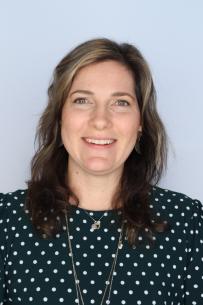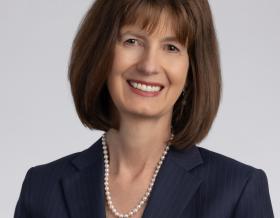Meet Chrissy Thom
Washington, D.C., U.S.

As Global Environmental Market Director, Chrissy Thom oversees one of Jacobs’ most critical offerings, with a positive impact on every client that we serve. As a business spanning Environmental, Water and other key end markets, the team delivers integrated solutions across the entire asset lifecycle, from early planning and advisory through characterization and consenting, to long-term asset management and regeneration.
With a technical background in biology, Chrissy spent her formative years researching how restored ecosystems can build resilience in our coastal communities. As a leader, Chrissy has leveraged her scientific training to help teams build an integrated approach, such as working on the complex interactions and patterns of an ecosystem. She focuses on connecting people in different areas of expertise and co-creating solutions that inspire and address current market and client challenges. Key focus areas include technical career development and leadership, inclusion and diversity, leveraging global connectivity, innovation, growth and sales, and delighting clients with excellent delivery experiences. With a variety of roles throughout her career, her passion is connecting people across different geographies and areas to create the best solutions for our clients.
“Across the diverse markets and geographies we serve, I am proud of Jacobs’ reputation as a trusted partner that our clients and communities rely on when the stakes are highest. It is the people and our innovative culture that make it happen, and my job is to unlock their potential.”
Get to know Chrissy
-
7.5 K
Environmental staff
-
8 K
estimated total number of Jacobs global projects where Environmental plays a role
-
100 +
cities and places she served as a project manager
-
1000 +
PFAS-affected sites, which have been investigated by Jacobs
Tell us a little bit about yourself and your career with Jacobs so far.
Over my career, I’ve made many stops, starts and pivots along the way. It didn’t start out this way, but now I see my superpower as spotting the patterns in disparate areas and innovating solutions out of the chaos — something that’s rooted in my training as an ecologist.
As I deal with challenges, I frequently draw from my technical experiences, from researching watershed management and infrastructure improvements to piloting an airboat through coastal marsh communities in my early days. I’ve learned so much about the different cultural connections to the places, lands and planet we call home, and that’s greatly influenced how I engage as a leader.
There’s another side to my career journey as well: recognizing I have a valuable contribution to make as a woman in a male-dominated industry. I grew up knowing I wanted to build the future in a meaningful way, though I didn’t feel I had the natural leadership instincts to achieve this. But through the science and some really good role models along the way, I began to test the boundaries of my strengths — a lot of the time I’d fall short on my ability to communicate a vision and inspire a team to think differently. But the more I tested and included different perspectives and expertise, the better I got at arriving at the right solutions. This is why I am so committed to STEAM outreach and mentoring talent across a diverse set of backgrounds and experiences, particularly those from under-considered and under-represented backgrounds, to achieve the most innovative outcomes.
What’s the favorite part of your role?
I really admire our global expertise. It's easier to charge the market when you know you've got really smart people behind you. Building capacity and inspiring people are key to my role. My experience in different roles and functions makes it easier to collaborate across sectors and ensure we are dialed in with different client perspectives.
What's something new you learned recently?
Engaging with Jacobs’ per- and polyfluoroalkyl substances (PFAS) strategy, which I lead on, I've learned a lot about how our deep domain expertise is not a monolith, but involves coordinating experts across 20 different disciplines. It's challenging and rewarding to come up with sustainable long-term solutions. Where I get my inspiration and confidence from is realizing that at the heart of finding these solutions is bringing people together and building relationships across diverse skills and technical and academic backgrounds. This is what makes the science stronger and the ultimate impact more powerful.















































